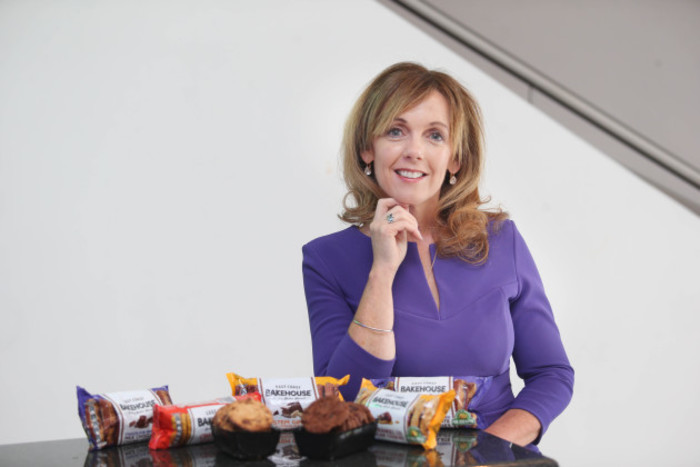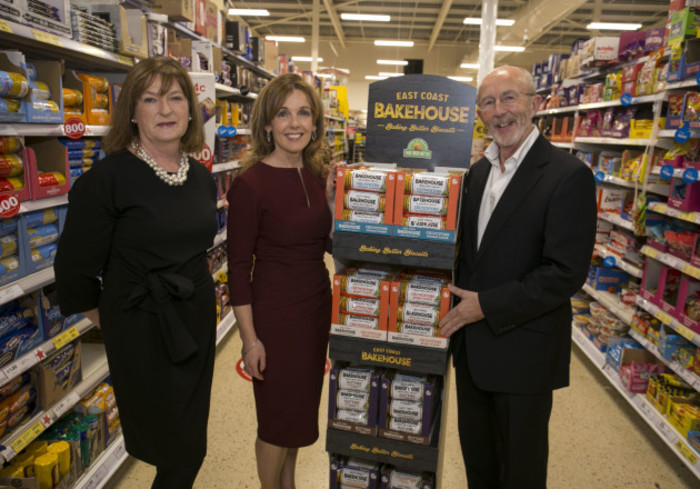Dragon Alison Cowzer's new biscuit firm has junked its UK growth plans due to Brexit
Drogheda-based East Coast Bakehouse plans to target the Middle East and mainland Europe instead.
WHILE BREXIT MAY inspire apathy in some Irish business leaders already sick of all the doom-and-gloom predictions, for Alison Cowzer the vote had a very real impact - a complete rethink of her firm’s UK expansion plans.
Dragons’ Den investor Cowzer and husband Michael Carey set up Drogheda-based biscuit company East Coast Bakehouse in 2015, using €15 million of their own money and private investors’ cash to get the new business off the ground.
The firm was banking on a major push into the UK as part of its growth plans, but the Brexit decision meant those plans needed to be drastically redrawn.
“We’ve changed our entire focus on the business plan away from the UK. We’re now looking at 20% of our business in that area instead of 80% – that’s a huge change for a business that is only 18 months old,” she told Fora.
She said that under World Trade Organisation (WTO) rules, which the UK will default to if no trade deal is struck with the EU, there are around 50 different factors that determine the tariffs on imported biscuits.
“If it all crashes and we end up with WTO tariffs in place, we will have a tariff on our exports to the UK between 9% and 23% depending on the type of biscuit. That is your margin gone, shot, finished. Close the doors.
“That has given us a real shove to change our strategic direction and our plan. You may say, ‘Why was your business plan so focused on one market anyway?’ Well, of course we shouldn’t have.”
Cowzer said the company is now exploring new markets in mainland Europe and the Middle East to grow the business, while its first container was shipped to the US last week.
 Alison Cowzer
Alison Cowzer
Another possible obstacle to the young but fancied firm is a trend away from traditional sweet treats and towards protein-enriched, low-sugar snacks.
Cowzer said that the firm is watching the development – and is plotting how it can get in on the action.
“We have to be honest, we are in the treats business. There is nothing wrong with the occasional biscuit – but I wouldn’t encourage you to eat an entire packet.
“So we are working on some healthy eating propositions at the moment like added-protein and sugar-free biscuits. The challenge is to take what is a snacking category and develop some more health aspects to it.”
Women in business
East Coast Bakehouse is far from Cowzer or Carey’s first venture into the food trade. The pair made their fortune through Fruitfield, which they sold in 2011 to Valeo Foods for a return of about €15 million.
They have also invested in several food businesses, including nutrition company Elivar and Dublin tapas bar Zaragoza. Cowzer has also headed up a food syndicate as part of the Halo Business Angel Network.
Following years in the boardroom, she was also recently ”reeled in” to be a director of Women4Election – a group campaigning for more female representation in Irish government.
Speaking after a pitching event to mark the end of an Enterprise Ireland female-focused mentor programme, Cowzer told Fora that putting in place enforced quotas was the only way to rapidly boost female representation in positions of power.
“We need systemic answers to the problem instead of organic change that will take 250 years. Systemic change will only be driven by sanctions, frankly. During the last election female representative in the Dáil went from 17% to 22%.
“Everybody wanted it to happen, but it was primarily driven by the quota and the fact that 30% of all candidates put forward by parties had to be women or else they would lose Exchequer funding. That was the key.”

Fear of failure
Cowzer added that women also remain seriously under-represented in business. At the moment there is a gender wage gap of 14% in Ireland and a dearth of females in senior corporate roles.
She said low participation could be down to the ‘fear of failure’ factor that she said can be more prevalent in female founders than their male counterparts.
“Maybe the fear of failure is ingrained in women – we’re less willing to take risks. Perhaps we may, in our dark moments, feel more defined by our failures than successes. And that’s something we need to get over.
“We need to accept failure. Not promote it or hope for it, but not put it in as a sanction against women.”
She said a lot of entrepreneurs can give off the illusion that the road to success was a smooth path, which can make women who fail in business less likely to try again.
“Be defined by your success, not the things that didn’t work out. Everyone, no matter how successful they are, will have failures. They might not talk about them, but they are there.”





